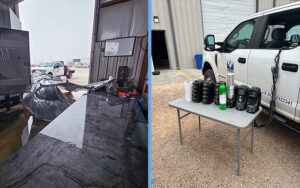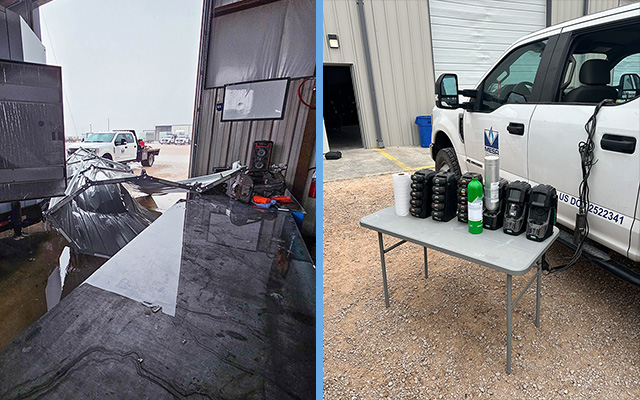To navigate to a specific Rule of Leadership, click the desired link.
To navigate to a specific section, click the desired link.
In the realm of leadership, few names resonate as powerfully as Jocko Willink. A former Navy SEAL commander turned motivational speaker and author, Jocko has captivated audiences worldwide with his no-nonsense approach to leadership and unwavering commitment to excellence. Central to his philosophy are the 12 Rules of Leadership, which he lays out in his book, Leadership Strategy and Tactics. (This title is on the Mesa Solutions’ reading list, which you can find here.) He gives a roadmap designed to inspire individuals to take charge, build strong teams, and achieve remarkable results. In this first of a series of four blogs, we’ll dive into the first three rules from Jocko’s arsenal, sharing stories from our own leaders here at Mesa. Below are some stories and insights to get you started.
Rule of Leadership #1: Be humble. It is an honor to be in a leadership position. Your team is counting on you to make the right decisions.
“Humility is a skill. We can get better or worse at being humble depending on how much attention we pay to our own ego. False humility is no different than an unchecked ego. For me, it is easier to share a story of when I wasn’t humble instead of an example of being humble (which seems like a paradox). One important note is that I didn’t know enough about myself to recognize the red flags of my ego coming off the rails. This break in humility eroded trust within my team and weakened my leadership capital for almost a year.
“About halfway through my time in the USMC, I had the privilege of being the Platoon Sergeant for the 1st Platoon in my unit. The Platoon Sergeant is second in command of about 30-45 Marines. (This number fluctuates depending on demand.) The Platoon Commander is the overall supervisor of the platoon. I had just finished a deployment with the 1st Platoon, and we were training our newest Marines. We were the best platoon of the three total within the unit. We were being tested by our leadership and had just completed a training iteration where we did exceptionally well. My leadership approached me and let me know that I would no longer be in the 1st Platoon and that they were moving me over to the 2nd Platoon. I had spent almost two years with the 1st Platoon and the 2nd Platoon was notoriously weaker and less trained. I was crushed.
“Instead of asking the “why” and being too naïve to understand that I was being moved to help strengthen a weak link in the unit, I went internal and shut down. I was short and unruly with my supervisor. I didn’t assimilate with the new Marines and held onto the bonds of the past. It was apparent to the new team that I didn’t want to be there and right from the onset they didn’t trust that I had their best interests at heart. My ego was completely unchecked, and I had failed.
“I wish there was a good ending to this story except I learned a leadership lesson the hard way. It took months for me to realize that I wasn’t being humble. To build trust back within the team was a harder journey than it should have been and looking back it is one of my biggest regrets in life. I am sharing this story because the lessons can be learned through personal experience, but this route is difficult and filled with struggles. Reading more books on this subject over the past years has helped me and others at Mesa learn these leadership lessons through the lens of others’ experiences. Through reading, I have become more adept at learning the red flags that help warn me that my ego is negatively impacting my ability to be humble. Some of these red flags include frustration, shutting down, and trying to solve problems alone. Ego is the enemy.”
Cruz Cabral, Field Operations Chief
Rule of Leadership #2: Don’t act like you know everything. You don’t. The team knows that. Ask smart questions.
“When I first moved into the safety department many months ago, I knew I didn’t know much and that I had a lot to learn. So, I studied, and I pushed myself to gain a better understanding of what safety is, how it’s applied, and common practices, and read books on the subject (Dysfunctional Practices by Timothy Ludwig will change your entire perception of human behavior), and I’m still learning new things to this day. With the advice, sometimes painful advice, of leaders and employees across the company, I have continually been able to discover new and better ways to do things. The more you learn, the more you begin to realize how much is out there that you don’t know.
“There isn’t a single person that you will ever meet that knows everything. If they claim that they do, or act like they do, run in the other direction. One of my favorite things about Mesa is that it is full of people who are lifelong learners. They continually push themselves to improve professionally and personally. If you haven’t taken on that mindset, I would highly suggest you give it a shot. You will be amazed at your capabilities once you start looking to improve and get out of your comfort zone.
“No one knows everything, but everyone knows something. You can learn something from every single person you ever meet, whether that is a good something or a bad something. There’s always something new to learn. The moment you think you have arrived and know all there is to know about something is the moment it is time to move on. If you aren’t striving to continually improve your knowledge, you are falling behind. We grow or we become stagnant and die. That choice falls directly on your own shoulders.”
Jerome Goodboe, HSE Manager
Rule of Leadership #3: Listen. Ask for advice and heed it.
“Prior to going overseas, I spent many hours with a friend of mine who had just come back from Afghanistan from working as a combat advisor to their military. I peppered him with questions about how he handled different situations. In the end, he said the number one thing is to listen to your gut feelings and go with it. It’s always right.
A few months later, I was sent overseas where I was assigned to be a combat advisor to work with our Afghan military counterparts. We would spend most of the time living and working with them at their location, and once a week, we would go back to an American base to refit and get everything ready to go back out again. On one refit day, it rained continuously – all day and night until the early morning hours when we started loading up our vehicles to go out. We had been working to investigate a corrupt Afghan commander and we were going back out to finish it.
While loading up and going through equipment checks, we had one problem after another. Switching out vehicles, switching out radios, and so forth. During that whole time, I had a weird feeling that something was off, but I couldn’t put my finger on it. Just then, I was told that our Afghan counterparts were waiting for us outside the gate to go with us to their base. I remembered my friend’s advice about trusting your gut feelings, so I told our team we were canceling the mission and doing a maintenance stand-down day. I then instructed the interpreter to tell the Afghans to go back to their base.
As the Afghans started leaving, they stopped directly in front of the gate to unbury an improved explosive device, put it in their vehicle, and drove away. My suspicion was that the corrupt commander had his soldiers plant the device the night before, but I couldn’t prove it. The one thing I did know was that by listening to and heeding my friend’s advice, there was a good chance that it prevented anyone from being hurt that day.
Mesa has amazing employees who bring to our company many diverse experiences. Great leaders will ask their employees, their peers, and their own supervisors for advice and should always listen to what is offered. We are all responsible for our own decisions and actions, but trusted advice from those whom you respect goes a long way in helping you make your decision.”
Ray Kent, Director of Human Resources
Check back in a few months for Part 2 of this 4-part series.
As a preview, here are the remaining nine rules:
- Treat people with respect.
- Take ownership of failures and mistakes.
- Pass credit for success up and down the chain.
- Work hard. As the leader, you should be working harder than anyone else on the team. No job is beneath you.
- Have integrity. Do what you say; say what you do. Don’t lie up or down the chain of command.
- Be balanced. Extreme actions and opinions are usually not good.
- Be decisive. When it is time to make a decision, make one.
- Build Relationships. That is your main goal as a leader. A team is a group of people who have
relationships and trust one another. Otherwise, it is just a disconnected, incoherent cluster of
people. - Lastly, get the job done. That is the purpose of a leader—to lead a team in accomplishing a
mission. If you don’t accomplish the mission, you fail as a leader. Performance counts.












